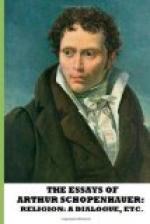Hence, in regard to reading, it is a very important thing to be able to refrain. Skill in doing so consists in not taking into one’s hands any book merely because at the time it happens to be extensively read; such as political or religious pamphlets, novels, poetry, and the like, which make a noise, and may even attain to several editions in the first and last year of their existence. Consider, rather, that the man who writes for fools is always sure of a large audience; be careful to limit your time for reading, and devote it exclusively to the works of those great minds of all times and countries, who o’ertop the rest of humanity, those whom the voice of fame points to as such. These alone really educate and instruct. You can never read bad literature too little, nor good literature too much. Bad books are intellectual poison; they destroy the mind. Because people always read what is new instead of the best of all ages, writers remain in the narrow circle of the ideas which happen to prevail in their time; and so the period sinks deeper and deeper into its own mire.
There are at all times two literatures in progress, running side by side, but little known to each other; the one real, the other only apparent. The former grows into permanent literature; it is pursued by those who live for science or poetry; its course is sober and quiet, but extremely slow; and it produces in Europe scarcely a dozen works in a century; these, however, are permanent. The other kind is pursued by persons who live on science or poetry; it goes at a gallop with much noise and shouting of partisans; and every twelve-month puts a thousand works on the market. But after a few years one asks, Where are they? where is the glory which came so soon and made so much clamor? This kind may be called fleeting, and the other, permanent literature.
In the history of politics, half a century is always a considerable time; the matter which goes to form them is ever on the move; there is always something going on. But in the history of literature there is often a complete standstill for the same period; nothing has happened, for clumsy attempts don’t count. You are just where you were fifty years previously.
To explain what I mean, let me compare the advance of knowledge among mankind to the course taken by a planet. The false paths on which humanity usually enters after every important advance are like the epicycles in the Ptolemaic system, and after passing through one of them, the world is just where it was before it entered it. But the great minds, who really bring the race further on its course do not accompany it on the epicycles it makes from time to time. This explains why posthumous fame is often bought at the expense of contemporary praise, and vice versa. An instance of such an epicycle is the philosophy started by Fichte and Schelling, and crowned by Hegel’s caricature of it. This epicycle was a deviation from the limit to which philosophy had been ultimately brought by Kant; and at that point I took it up again afterwards, to carry it further. In the intervening period the sham philosophers I have mentioned and some others went through their epicycle, which had just come to an end; so that those who went with them on their course are conscious of the fact that they are exactly at the point from which they started.




